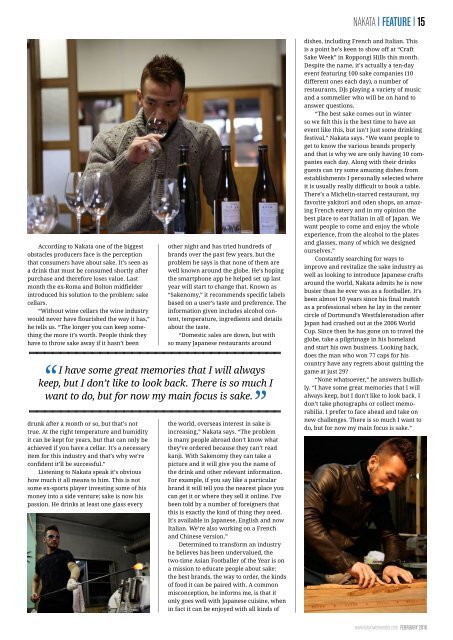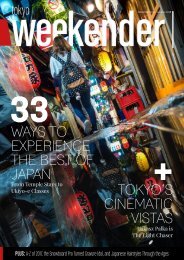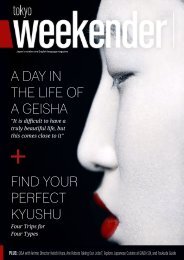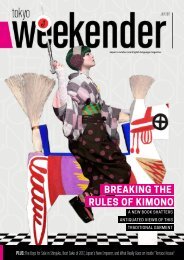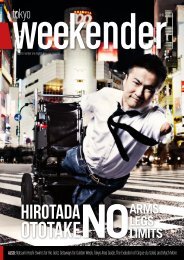Tokyo Weekender - February 2016
Hidetoshi Nakata a soccer all-star on the sake trail. The Tokyo Marathon turns ten. Scaling Japan’s frozen heights.
Hidetoshi Nakata a soccer all-star on the sake trail. The Tokyo Marathon turns ten. Scaling Japan’s frozen heights.
Create successful ePaper yourself
Turn your PDF publications into a flip-book with our unique Google optimized e-Paper software.
NAKATA | FEATURE | 15<br />
According to Nakata one of the biggest<br />
obstacles producers face is the perception<br />
that consumers have about sake. It’s seen as<br />
a drink that must be consumed shortly after<br />
purchase and therefore loses value. Last<br />
month the ex-Roma and Bolton midfielder<br />
introduced his solution to the problem: sake<br />
cellars.<br />
“Without wine cellars the wine industry<br />
would never have flourished the way it has,”<br />
he tells us. “The longer you can keep something<br />
the more it’s worth. People think they<br />
have to throw sake away if it hasn’t been<br />
drunk after a month or so, but that’s not<br />
true. At the right temperature and humidity<br />
it can be kept for years, but that can only be<br />
achieved if you have a cellar. It’s a necessary<br />
item for this industry and that’s why we’re<br />
confident it’ll be successful.”<br />
Listening to Nakata speak it’s obvious<br />
how much it all means to him. This is not<br />
some ex-sports player investing some of his<br />
money into a side venture; sake is now his<br />
passion. He drinks at least one glass every<br />
other night and has tried hundreds of<br />
brands over the past few years, but the<br />
problem he says is that none of them are<br />
well known around the globe. He’s hoping<br />
the smartphone app he helped set up last<br />
year will start to change that. Known as<br />
“Sakenomy,” it recommends specific labels<br />
based on a user’s taste and preference. The<br />
information given includes alcohol content,<br />
temperature, ingredients and details<br />
about the taste.<br />
“Domestic sales are down, but with<br />
so many Japanese restaurants around<br />
I have some great memories that I will always<br />
keep, but I don’t like to look back. There is so much I<br />
want to do, but for now my main focus is sake.<br />
the world, overseas interest in sake is<br />
increasing,” Nakata says. “The problem<br />
is many people abroad don’t know what<br />
they’ve ordered because they can’t read<br />
kanji. With Sakenomy they can take a<br />
picture and it will give you the name of<br />
the drink and other relevant information.<br />
For example, if you say like a particular<br />
brand it will tell you the nearest place you<br />
can get it or where they sell it online. I’ve<br />
been told by a number of foreigners that<br />
this is exactly the kind of thing they need.<br />
It’s available in Japanese, English and now<br />
Italian. We’re also working on a French<br />
and Chinese version.”<br />
Determined to transform an industry<br />
he believes has been undervalued, the<br />
two-time Asian Footballer of the Year is on<br />
a mission to educate people about sake:<br />
the best brands, the way to order, the kinds<br />
of food it can be paired with. A common<br />
misconception, he informs me, is that it<br />
only goes well with Japanese cuisine, when<br />
in fact it can be enjoyed with all kinds of<br />
dishes, including French and Italian. This<br />
is a point he’s keen to show off at “Craft<br />
Sake Week” in Roppongi Hills this month.<br />
Despite the name, it’s actually a ten-day<br />
event featuring 100 sake companies (10<br />
different ones each day), a number of<br />
restaurants, DJs playing a variety of music<br />
and a sommelier who will be on hand to<br />
answer questions.<br />
“The best sake comes out in winter<br />
so we felt this is the best time to have an<br />
event like this, but isn’t just some drinking<br />
festival,” Nakata says. “We want people to<br />
get to know the various brands properly<br />
and that is why we are only having 10 companies<br />
each day. Along with their drinks<br />
guests can try some amazing dishes from<br />
establishments I personally selected where<br />
it is usually really difficult to book a table.<br />
There’s a Michelin-starred restaurant, my<br />
favorite yakitori and oden shops, an amazing<br />
French eatery and in my opinion the<br />
best place to eat Italian in all of Japan. We<br />
want people to come and enjoy the whole<br />
experience, from the alcohol to the plates<br />
and glasses, many of which we designed<br />
ourselves.”<br />
Constantly searching for ways to<br />
improve and revitalize the sake industry as<br />
well as looking to introduce Japanese crafts<br />
around the world, Nakata admits he is now<br />
busier than he ever was as a footballer. It’s<br />
been almost 10 years since his final match<br />
as a professional when he lay in the center<br />
circle of Dortmund’s Westfalenstadion after<br />
Japan had crashed out at the 2006 World<br />
Cup. Since then he has gone on to travel the<br />
globe, take a pilgrimage in his homeland<br />
and start his own business. Looking back,<br />
does the man who won 77 caps for his<br />
country have any regrets about quitting the<br />
game at just 29?<br />
“None whatsoever,” he answers bullishly.<br />
“I have some great memories that I will<br />
always keep, but I don’t like to look back. I<br />
don’t take photographs or collect memorabilia.<br />
I prefer to face ahead and take on<br />
new challenges. There is so much I want to<br />
do, but for now my main focus is sake.”<br />
www.tokyoweekender.com FEBRUARY <strong>2016</strong>


